
- Jinnistan
- Administrator
 Offline
Offline 
Re: Recently Seen
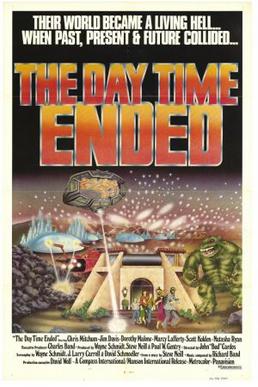
Pretty much a low-rent Close Encounters from the Charles Band/Full Moon crew, the film is awfully cheesy but does have a segment with some nifty but sub-Harryhausen stop-motion work. I can think of worse ways to waste your time.
6.5/10
"Are you sure you're not afraid of ghosts?" "Are you kidding? At these prices?"
Cheap indeed , this time from early Troma studios, shot in the Philippines with John Saxon, Lynda Day George and a bunch of familiar but unnamable faces from 1970s television. The leads are admirable enough, but the film is standard haunted house/possession fare, and even the film's flirtations with some of the native flavors of occult are superficial. And we do get a generous amount of the trendy kryptonite glow, which was so de rigueur in 1980 low-budget FX, and more memorably utilized in the same year's The Boogey Man.
7/10
- Jinnistan
- Administrator
 Offline
Offline 
Re: Recently Seen
Some steel-scrotum Italian poliziotteschi...
The Sicilian Connection has gruff-mannered Ben Gazzara handling his damned Ben Gazzara business, setting up some opium (morphine-base) trade without unsettling the Sicilian and Marseilles mafias, while taking the time to Gazzara-handle freshly-showered Silvia Monti on the side. Tight and tough direction from Ferdinando Baldi, although the copy I watched had some poor dubbing. This film may not be as good as Gazzara's other tough-guy classics like Chinese Bookie or Saint Jack, but it's not as far behind as you may think either.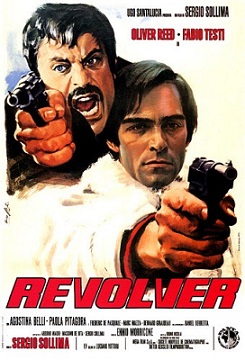
Oliver Reed's wife is kidnapped to force him into aiding the prison escape of Fabio Testi, but after both Reed and Testi are double-crossed, they have to join forces to figure out the criminals behind the scheme. Also tautly directed by Sergio Sollima (Big Gundown, Violent City), the film's only flaw is in the fact that it only uses automatic lugers instead of revolvers. Just saying.
A rare match-up between Delon and Bronson, former army buddies who find themselves entwined in a vault heist, eventually locked in together for much of the film, sweating and showing off their respective chest-grooming. Not a lot of action but plenty of intrigue, and the film rests on the leads' chemistry. This was a big hit in France, but only sporadically released in America under numerous names (Honor Among Thieves, Farewell Friend), but worth seeking out for fans of either or both of its stars.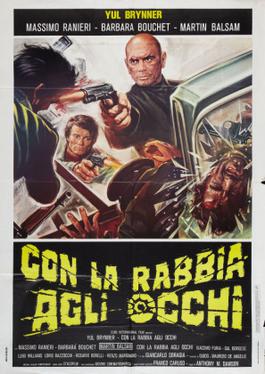
Death Bang (orig. With Anger in His Eyes) has Yul Brynner as a retired hit man hired to settle some scores between mobsters in Naples, and settles some of his own. This would be Brynner's last film role incidentally. Also has Martin Balsam and Barbara Bouchet. Good score from De Angelis brothers and a classy opening which saves the credits until 15 minutes in, this is a pretty solid entry from prolific journeyman Antonio Margheriti, who has often been less than solid.
All - 7.5/10
- •
- Jinnistan
- Administrator
 Offline
Offline 
Re: Recently Seen
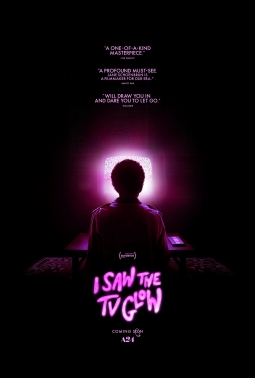
Deeply Lynchian examination of the convergence of media, dream and imagination, of the conflation of so-called parasocial relationships with real social experience. Those familiar with the thorough Twin Peaks exegesis published on youtube a few years back will recognize the significance of this TV "glow" in Lynch's terms, as the "garmanbozia" energy, presented as glowing TV static, which possesses our collective subconsciousness - echoing McLuhan's "TV is a collective dream" observation - in an almost identical way as the fictional TV show, The Pink Opaque, does here. In this film, the collective dream inspired by The Pink Opaque concerns two young viewers in particular, who become wholly fascinated, even obsessed, by this show which is abstractly presented in a very similar Lynchian-mode, involving an overly literal metaphorical villain, Mr. Melancholy, who traps a couple of young psychics in a "Midnight Realm" (ie, "the Red Room", etc). Eventually, of the two teenage viewers, Owen and Maddy, the latter's obsession with the show leads her to begin to believe that she herself is a living participant in the show, and tries to convince Owen of this reality.
Much of the commentary for the film lies in its transgender themes and intentions of the writer/director Jane Schoenbrun. I'll set those aside to describe my own personal reactions and what I think are more universal elements of the film's implications on alienation, dissociation and parasocial obsession. Despite the more facile similarities with David Lych's work, the primary comparison is with the subject of psychological dissociation, especially in work like Twin Peaks, Lost Highway and Mulholland Dr, and the latter provides a similar instance of a character whose media obsession, whose need to reflect (refract) herself through media's artificial lens creates a breakdown in personality. It isn't difficult to see how problematic this implication becomes when applied to questions of identiy politics, and might be more challenging than some of the commentary I've read is allowing. Through the film's confusion of reality and fiction, the dream of TV's glow and actual subconsciousness, of parasocial relationships and the tendency to treat real-life others as figments of our own imagined dramas, the audience is led through a variety of potential interpretations of how we simultaneously relate to media and how we relate to each other. But ultimately, in the film, these media and parasocial obsessions are ultimately shown as harmful, whether burying ourselves in delusion or disillusioning ourselves from the dream itself.
Regardless of the reading, the film is truly one of the year's most thought-provoking and evocative. I'm willing to bet that it's even better than Wicked.
9/10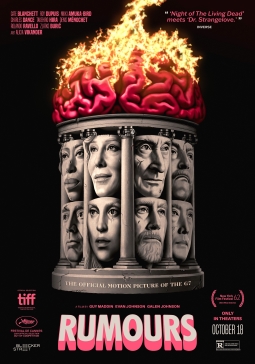
Satires of the ruling elite are nearly as old as cinema itself, from Rules of the Game to Exterminating Angel. Guy Maddin's film follows more closely to Bunuel's model, with an absurdist take on a discreet remote meeting of the G7 leadership, with each of them playing as cartoon caricatures of their respective cultures and stereotypes. Much of it isn't difficult to decode - Canada's is over-sexed and immature (Trudeau), America's is old and sleepy (Biden), Germany is a technocrat businesswoman (Merkle), Britain is a thin shadow of multiculturalism (Sunak), France is bloated, sentimental, passive-aggressive (probably more Chirac, Sarkozy and Hollande than Macron, but whatever), and Italy and Japan are just happy to be a part of the team. It's cute how Maddin makes Canada kinda central here, but there's all sorts of ways that we can interpret the dynamics at play.
The satire works pretty well, but nowhere near as sharp as someone like Armando Iannuchi, while knowing Maddin's penchant for the surreal helps to forgive where the absurdity stretches into the outright incongruous. Unfortunatley, the film takes a sour turn in its final few minutes, and we begin to sense the spectre of the missing chair of the old G8, and the film starts to look more like bitter and petty revenge. Unlike something like Dr. Strangelove, the satire here is not so well balanced, and comes off rather distasteful in the current context. Maybe portraying all of the NATO ally flags burning in unison at the end was a little unsubtle. Also, Maddin felt the need to toss his fellow Winnipegger, Neil Young, under the bus as an emblem of the "very rock and roll" cultural suicide of the liberal democratic West.
5/10 (docked significantly for sheer gall)
- •
- Jinnistan
- Administrator
 Offline
Offline 
Re: Recently Seen
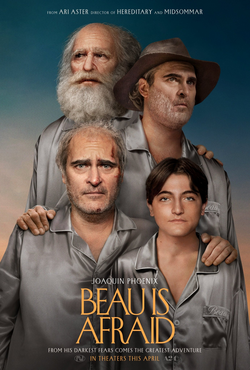
If, like me, you might have found Ari Aster's previous horror films to occasionally cross the line from expertly rendering trauma and anxiety as themes to exploitation of the same trauma and anxiety for cheap emotional punches, then, like me, you may find that the best thing for Aster would be to forgo horror in his next project and instead create a colossal Charlie Kaufman-ode that serves as a hysterical (in both terms of pitch and humor) parody of trauma/anxiety indulgence in modern cinema. This may also be why I find it so funny, and idiotic, to see so many critics complain about the film's indulgence. The film is a lot, a three-hour absurdist romp that clearly makes little sense in any real-world context. So much the better for it. Not only is it Aster's best film, but it's far superior to Phoenix's Oscar-winning performance in the much more exploitative Joker. Critics and the public are bound to come around to see these clear truths in about a decade or so, but for now, I relish their hatred.
8.5/10
This is a good example of a quickly forgotten film that I wish I could make a good underdog case for. The subject matter is obviously compelling, involving accusations of complicity or possible collusion between the LAPD and Suge Knight's Death Row Records and the Bloods street gang, most pertinently relating to the murder of the Notorious BIG in 1997, material which is based on the work of officer Russell Poole who was also involved in uncovering the department's "Rampart" scandal, but was forced to resign rather than continue to pursue his investigation. And Johnny Depp does deliver a fine performance as Poole.. The film got buried just prior to release, and there's very good evidence that the LAPD was involved in this decision, although Depp's own reputational issues at the time were also a factor. Given this background, it's very easy to arouse sympathy for the film's failure and relative obscurity.
Unfortunately, the film is simply not very good, mostly due to the fact that director Brad Furman is a hack, and employs very typically lazy TV-style editing which completely ruins any chemistry that may have resulted from scenes involving the two strong lead actors, Depp and Whitaker (the latter is apparently a fictitious invention for the film), who could have been impressive had they been allowed to exist in the same space for more than 3 seconds without a cut. More fortunately, for anyone interested in the larger story, there are any number of documentaries (ie, Biggie and Tupac) or books (LAbyrinth) which provide valuable information into the investigation. And for the Rampart scandal, there's a superior 2011 film starring Woody Harrelson called Rampart. City of Lies is just schlock better suited for reruns on any random cable channel.
6/10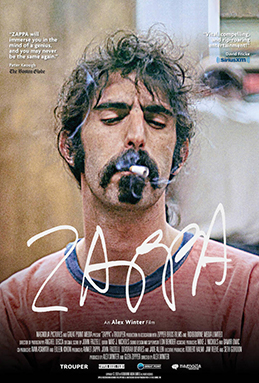
Among the recent trend of hagiographic documentaries on mid-late 20th Century artists, this one is both formally typical (director Alex Winter is obviously a fan but also a fairly conventional filmmaker) and, at least, a bit more incisive with its "talking head" format by focusing on those musicians closest to Zappa. And as expected from the format, there's a treasure of unseen footage (Zappa was a voracious archivist) and not a lot of music which plays longer than a 20-30 seconds at a time. But the doc offers a good preliminary introduction to the man and artist, Frank Zappa, adequately illustrates his accomplishments, philosophies, relationships and covers the basics of his career touchstones. And the doc serves as a good demonstration of what a wonderful intervewee Zappa could be, caustic and intelligent, which could inspire those to seek out longer-form interviews available on youtube and elsewhere. A deeply prolific and exploratory artist, this year saw some diminishment on that shine with the release of daughter Moon Unit's memoir which detailed the domestic costs for such prolific ambition and work ethic by noting his frequent absence for her childhood. This doc doesn't stray into such critical areas, or address some of the more tragic family disputes which arose after Zappa's death. (Moon Unit was apparently kept out of the estates' fortunes by her mother, Gail.) All of that drama aside, again, this is a solid portrait.
8/10
- •
- Jinnistan
- Administrator
 Offline
Offline 
Re: Recently Seen

Did you think I was going to sit around and wait for Netflix, in their stingy little wisdom, to finally release this film this upcoming Friday, instead of last week before the holidays when families had an opportunity to enjoy this pure simple pleasure like some kind of old-fashioned heart-warming entertainment that people have traditionally sought out during the holiday season? Because god forbid the Netflix audience misses out on the football and Beyonce that should have played on braodcast television, as it also always has in the holiday season. Wouldn't want to give that Netflix audience a choice to tune in to this fine animation instead, lest those highly touted football ratings numbers reveal what an awful business decision it was to air these previously free games exclusively on a paid platform in the first place. Concussions and Cow-Hop. Merry Christmas, fuckfaces.
Thankfully, the true wisdom of the venerable BBC knew better to air this wonderful and delightful film on Christmas Day, and therefore a fine and flawless copy of the film was thus available for me to snatch and steal. This is Netflix's pettiness which turns a good man to crime.
The only other recommendation I have, since watching this marvelously charming motion picture should be a forgone conclusion, is to maybe prep with a rewatch of Wrong Trousers first, especially if watching with anyone who has not been familiar with the series. Feathers McGraw is already a perfectly absurd character in any context, but his appearance here does assume some prior knowledge to fully appreciate. Once upon a time, I harbored the theory about the ending of Wrong Trousers, that Feathers McGraw had somehow managed to reactivate the "techno-trousers" to help bust him out of the zoo-prison. We never knew the truth, as we only saw the trousers parading off into the sunset. Well, this theory doesn't exactly bear fruit, but this resulting sequel does manage to be close enough to my theory in other unexpected ways. That's all I'll say about that.
Steal this movie and don't give Netflix a nickle until they wise the fuck up.
8.5/10
Allegedly part of a late-career trilogy, bound by themes, this film isn't any more distinguishable from the kinds of thematic films Paul Schrader has always made. Schrader fetishizes ascetic suffering and Calvinist guilt complexes, and in this sense, this is no different from Taxi Driver, Hardcore, Rolling Thunder, Raging Bull, Mishima, Light Sleeper, Bringing Out the Dead, etc. That's not to say that these films aren't good; most of them are classics. It's just to point out that there's nothing particularly ground-breaking about Schrader's more recent films, and it's amusing to read critics who treat them as if they're only realizing these themes for the first time.
Card Counter is yet another one of these ascetically suffering guilty/stoic anti-heroes, this time defined by a more topical background as a former participant in Abu Ghraib torture. In addition to serving time in military prison for these actions, Oscar Isaac's "William Tell" (heh) flagellates through emotional and sensual self-denial, willing to live out his life as a simple, and simply successful, gambler. That is until he takes in a young "kid" (that's his name) to try and steer his life in the right direction. But we've all seen Mean Streets too, right?
Isaac is really good in the role, and single-handedly makes it compelling enough to watch. Most of the performances are pretty good, except Tye Sheridan as the "kid", who's just frankly awful and completely unconvincing in either his vulnerability or his menace. He's just a posing little shithead, and impossible to take seriously. As for Schrader, I suppose the nicest thing to say is that he avoids the disaster of First Reformed by managing not to vulgarize the spiritual graces of his cinematic superiors like Bergman and Bresson. Instead of ripping off, and bastardizing, true classics like Winter Light, he simply rips off himself, including a poorly advised plagiarism of the final shot of American Gigolo (itself another "homage" from Bresson's Pickpocket, but not nearly as insulting).
7/10
- •
- Jinnistan
- Administrator
 Offline
Offline 
Re: Recently Seen

Robert Eggers continues to be one of our great visionary filmmakers. Even if he botched the couple of most iconic scenes from the original Murnau film, it has the impression that this was done as a form of subversion, as not even trying to compete with the great original on those terms, and there are so many other smaller attempts at iconic imagery throughout this film that it makes such a comparison irrelevant. A tremendous movie.
8.5/10
(Due to my fowl haste, I did immediately try to find a version online for a rewatch, and although the only version was a CAM torrent, I used the opportunity for a B&W viewing, and it was very promising, even with those limitations. I look forward to the same experiment with a proper copy, but I already feel that this is a future B&W alternative classic.)
- •
- Jinnistan
- Administrator
 Offline
Offline 
Re: Recently Seen

The Asassination Bureau is an international consortum of history-engineering elites, culling (at a profit) society's reprobates based on their own skewed moral standards. The Bureau's heir apparent chairman, Oliver Reed, finds himself as a target, at the instigation of collegue and competitor Telly Savalas, a newspaper tycoon, and so Reed sets out to eliminate the rest of the consortium first, setting out, with journalist Diana Riggs (employed by Savalas' newspaper), on a spree through Europe, which is on the verge of the outbreak of World War I.
The film is more of a screwball comedy than a political thriller, very much steeped in the English '60s' nostalgia for anything Edwardian. As such, the film is very charming if a bit old-fashioned, or rather its charm is in how comfortably old-fashioned it is. And as an additional interest, this film also serves a precedent for one of the most lauded purported innovations of Tarantino's Inglorious Basterds approach to historical fidelity, because this film strongly implies that Reed and Riggs managed to avert WWI from happening.
7.5/10
Apparently Jon Voight's film debut, shot in the mid-60s but, evidenced by the above poster, re-released to cash in on Voight's post-Midnight Cowboy success. And amusingly, this film also is premised on Voight's country bumpkin arriving in the Big City (this time Chicago). But aside from that this is a very different film. It's a silly, cartoonish, almost infantile farce with "Frank" - said country boy killed almost immediately by the mob - resurrected by a mad scientist who uses this Buck-Adonis as a superhero to battle evil and rend revenge on the same mob. And just as Frank starts to feel his oats a bit, another "evil Frank" (Voight with a face scar) is introduced on behalf of the mob as his nemesis.
More interestingly than being a minor touchstone in Voight's career is that this film is also an early independent production by writer-director Philip Kaufman, who obviously would go on to a more acclaimed career (Body Snatchers '78, The Right Stuff, Unbearable Lightness of Being). This film is like early stoner humor, more Laugh-In than MASH, more like a less gaudy but still corny version of Batman. Outside of Voight, the film has a pretty curious Chicago-local cast, with a number of Second City players helping out (David Steinberg, Severn Darden, Anthony Holland), a few deep-pocket hipsters (Ken Nordine, Ben Carruthers, Nelson Algren), and for some reason '50s bombshell Monique van Vooren as its spectral muse. In short, it's far more interesting as a period cultural curio than entertainment.
7/10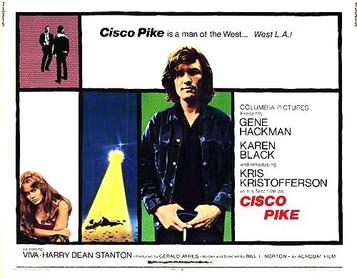
I guess I owe it to the late Kris Kristofferson to finally watch his film debut, where he plays a pot dealer trying to quit the game and launch his fledgling music career, which was also a film which was largely unavailable for 30 years and only somewhat recently revived. The film was also the debut for writer-director Bill L. Norton, who would go on to make films such as Baby, Secret of the Lost Kingdom and a couple of those Kevin Sorbo Hercules movies.
Thankfully, the script was heavily doctored by Robert Towne, who expanded the role of the girlfriend, Karen Black, and added the crucial Gene Hackman character, a narc cop who's using Cisco for his own ends. Fortunate, since these are both far more compelling characters, and performances, than Kristofferson's Cisco, which, let's face it, is basically just Kris Kristofferson. (There's a reason why he got thrid billing despite being the title character.) A late addition to the film is a welcome Harry Dean Stanton, playing a former musical partner of Cisco, who arrives on a regimen of smack and speed, and small detours led by Warhol (groupie) regulars Viva and Joy Bang. They contribute a bit of much needed seediness to the proceedings, and Stanton, as is his wont, provides yet another strong performance with which to shadow over Kristofferson. But the MVP is still Hackman, superbly playing close to the chest, unsettlingly unpredictable.
And, I mean, jeez, Kristofferson ain't even too bad.
8/10
Terence Young, of the early (and best) James Bond films, had a notorious late-career slump, resigning himself to tedious hackwork, but it's still hard to resist when faced with such a stellar British cast as offered here - Michael Caine, Laurence Olivier, Robert Powell, Charles Grey, Susan George, Anthony Dawson. Yes, 1983 would still seem well past each of those actors' respective primes, but how bad could it be?
Well, not bad, just terribly dull, which is much worse than bad. I would have cherished a little camp here, and, I'm sorry, Michael Caine's very ugly attempts at accent-work (both Russian and American) just isn't enough to qualify. Unsurprisingly, it looks like the film had a number of financial issues behind the scenes, which tends to result in product this hollow and toneless.
6/10
- •
- Jinnistan
- Administrator
 Offline
Offline 
Re: Recently Seen

As can be seen from the poster, this film is a bit of a troll, and I'm sure the filmmakers can try to claim that their cynical political satire skews "both sides" in abundance - showing liberals as rich and shallowly woke snobs and "deplorables" as kind of thick, dim and conspiracy minded - it nonetheless offers only a very glib and superficial understanding of class and politics, exploiting current divisiveness without saying anything substantial. In fact such glibness is exactly in line with the stunted cultural issues the film thinks it's critiquing. All of the politics aside, the film has some amusing side performers - Glenn Howerton, Macon Blair, Ike Barinholtz, Sturgill Simpson - and Betty Gilpin and Hillary Swank aren't bad as the twin leads, but ultimately, as an action movie in the "Most Dangerous Game" tradition, it's still pretty lame. As satire, it's not enough to show how our educated elites don't understand Orwell's Animal Farm when there's no real indication that these filmmakers do either.
5/10
Project Wolf Hunting has the ingrediants for cult success. The initial premise is like Con-Air on a cargo ship, extradicting criminals from the Philippines to Korea and the ensuing mutiny. The film throws in a bit of a twist about genetic experimentation, and whether this sci-fi addition gels with the audience may depend on, say, one's previous reaction to a somewhat similar twist in Danny Boyle's Sunshine. But despite all of the tension and action excitement that this film delivers, the problem with over-the-top carnage is that it becomes monotonous and redundent at a certain point, and it's been a liability in recent Korean genre films to lack restraint which could paradoxically enhance the impact of the more explosive moments if the entire tone wasn't constantly at 11. Still, it's a fun picture
7.5/10
- •
- Rock
- Moderator
 Offline
Offline 
Re: Recently Seen
Enjoyed Project Wolf Hunting when I saw it at TIFF. Not a “good” movie exactly, but I had fun with the outrageous violence. (There’s usually at least one movie each year st TIFF that gets hyped up in that respect.)
I am not above abusing mod powers for my own amusement.
- Jinnistan
- Administrator
 Offline
Offline 
Re: Recently Seen
Rock wrote:
Enjoyed Project Wolf Hunting when I saw it at TIFF. Not a “good” movie exactly, but I had fun with the outrageous violence. (There’s usually at least one movie each year st TIFF that gets hyped up in that respect.)
I'm sure it would be great with a large appreciative crowd. But I was getting numbed by around the 8th or 9th throat ripped out. It doesn't transcend to the Raimi-esque cartoonishness of something like Ricky-Oh.
- •
- Jinnistan
- Administrator
 Offline
Offline 
Re: Recently Seen

Yorgos Lanthimos reunites with his early screenwriter, Efthimus Filippou, which shows in this film's return to the darker, caustic comedy which marked the Lanthimos brand (ie, Dogtooth, Killing of the Sacred Deer), and which is far too cynical to allow any of the contrived political commentary later attached by favorable critics to his recent films like Poor Things (commentary which I felt was misplaced and overinflated to begin with). Which doesn't necessarily mean that this film is better, but may explain how it has been inexplicably ignored during this late award season. Jesse Plemons and Willem Dafoe are easily as worthy here as the prior film's nominees.
The film is a trilogy of tales, all somewhat modern takes on various forms of control and delusion, all featuring the same cast ensemble in different roles. Called "loosely connected", the emphasis on loosely does a lot of work. I'm sure there's some work to be done to draw all sorts of analogies between each actor's respective roles. Out of the three, I'd say that the first and last have the most in common, in terms of connective tissue, both revolving roughly around Dafoe's pair of cult-like figures, one a mesmerizing manipulative executive, taking full advantage of Plemons' docile and dependent underling, and the latter a more explicit leader of a sex cult, with similar command over members Plemons and Emma Stone, who are on a psychic hunt for a young woman, Margaret Qualley, who may have a powerful supernatural ability. The mysterious character of "R.M.R.", who is killed on one and resurrected in the other, is about as much of a thread as we have to hang any throughline here. Out of the three tales, the second is both the less successful and the least relevant to the others, but still provides plenty of Lanthimos' unsettling sense of surreal insanity.
In the end, all of the details about "plot" and character are beside the point, and the point is simply the detached, almost whimsical mischief of Lanthimos' camera, the sinister chill of indifference, the straight-face of its absurdity, which gives the film its quiet anxiety and makes it so darkly amusing. Also, Margaret Qualley has fabulous legs.
8.5/10
I'm not going to waste a review on this wretched mess untangling all of its very very many incongruities, all of the chronological convolutions no matter how arbitrary, how petty or how completely unnecessary for any cognizant narrative purpose. Rest assured that this is a deeply contrived and dishonest motion picture even in its conception, which only a token glimpse at a more substantial film, like No Direction Home, will reveal as such. It isn't about the necessary expediencies of culling and forcing biographical details to fit a satisying dramatic arc, because the already-formulated dramatic arc of Scorsese's documentary still remains a far superior narrative.
No, instead, I'll stick to focusing on the single central dilemma which proves to be the truly fatal problem of the film - Timothy Chalamet is pretty much a shit actor. I've seen him now in several films, and I've never been impressed with him, never really believed him in any role, except maybe when his role is so minor (Lady Bird, Don't Look Up) that his lack of emotional presence fits the part. And although, as with so many actors, we could always invoke the matter of personal taste, how some actors agree with our sensibilities more than others, I would assert that we do have more of an objective metric here, which is the tiny ton of documentary footage of the one Bob Dylan, by which we have to measure the success in Chalamet's goal in inhabiting the man he seeks to represent. There's also the canard about how an actor's performance should not be reduced to mere impersonation, but that doesn't excuse Chalamet here for doing what looks like a very poor Bob Dylan impersonation.
Let's look at two characteristics in particular, deceptively superficial. Now, I'm not the kind of critic who demands that casting be always determined by physical attributes, and I would not say that an actor portraying Dylan must, for example, have his baby blue eyes, rather than Chalamet's chocolate goobers, because even brown-eyed actors are capable of a certain radiance. I also want to point out that I do not find the aspect of the eyes to be so superficial anyway, not to quote the cliche of the window of the soul, but merely to emphasize the emotional importance inherent in their expression. And as I've long maintained that Dylan has a far more expressive voice than he's given credit for, I think we have to acknowledge that he also has tremendously expressive eyes. Not just in their blue boyishness, but his ability ot sparkle them, his ability to seemingly wink without moving an eyelid. And it is quite remarkable just how little Chalamet ever smiles in this film, deviating again from one of Dylan's more charming characteristics, that sly grin that he flashes disarmingly. In these two characteristic failures alone, Chalamet's Dylan is bereft of his impish charm and humor, his clever mischief, his razor wit. Sure, we can say that the film does not shy away from showing some of Dylan's less admirable traits - his selfishness, his slipperiness, his occasional venom - but the film fails to show those twin traits which made him so equally lovable to those people around him. This film is never convincing about why anyone bothered to put up with him. It wasn't just his sheer talent alone. Very tellingly, Chalamet becomes slightly more effective at his portrayal in those second-half scenes where he's safely ensconced behind his shades, and his menacing qualities more appropriate. But without those shades, Chalamet just looks like a selfish creep. His eyes are exceptionally inexpressive, just dark, empty holes. Too bad he didn't get the role of Syd Barrett instead.
I don't even think Chalamet's that good a singer, even though that's been a big part of the hype around the film, but I definitely don't care for the representational song selection. I mean, why is he debuting his "new" song "Times They Are A-Changing" after he wrote "Rolling Stone"? OK, no, I said I'm not going to go down that road. I'll just point out that the actual new song that Dylan debuted at the 1964 Newport Festival was "Mr. Tambourine Man", and I honestly see no reason why that wouldn't have been the better choice for the scene. The proper place for "Times" would have been the 1963 March on Washington, which, despite it's obvious and momentous context, was overlooked in this film, only shown for one brief and hilariously inept CGI image.
Anyway, too bad we didn't get a better film incorporating this film's more successful features, like an Edward Norton/Pete Seeger film or a Monica Barbaro/Joan Baez film, but ultimately I'm sure some Hollywood studio would find a way to muck those into milquetoast mush as well.
5/10
- •
- crumbsroom
- Moderator
 Offline
Offline 
Re: Recently Seen
Jinnistan wrote:
I'm not going to waste a review on this wretched mess untangling all of its very very many incongruities, all of the chronological convolutions no matter how arbitrary, how petty or how completely unnecessary for any cognizant narrative purpose. Rest assured that this is a deeply contrived and dishonest motion picture even in its conception, which only a token glimpse at a more substantial film, like No Direction Home, will reveal as such. It isn't about the necessary expediencies of culling and forcing biographical details to fit a satisying dramatic arc, because the already-formulated dramatic arc of Scorsese's documentary still remains a far superior narrative.
No, instead, I'll stick to focusing on the single central dilemma which proves to be the truly fatal problem of the film - Timothy Chalamet is pretty much a shit actor. I've seen him now in several films, and I've never been impressed with him, never really believed him in any role, except maybe when his role is so minor (Lady Bird, Don't Look Up) that his lack of emotional presence fits the part. And although, as with so many actors, we could always invoke the matter of personal taste, how some actors agree with our sensibilities more than others, I would assert that we do have more of an objective metric here, which is the tiny ton of documentary footage of the one Bob Dylan, by which we have to measure the success in Chalamet's goal in inhabiting the man he seeks to represent. There's also the canard about how an actor's performance should not be reduced to mere impersonation, but that doesn't excuse Chalamet here for doing what looks like a very poor Bob Dylan impersonation.
Let's look at two characteristics in particular, deceptively superficial. Now, I'm not the kind of critic who demands that casting be always determined by physical attributes, and I would not say that an actor portraying Dylan must, for example, have his baby blue eyes, rather than Chalamet's chocolate goobers, because even brown-eyed actors are capable of a certain radiance. I also want to point out that I do not find the aspect of the eyes to be so superficial anyway, not to quote the cliche of the window of the soul, but merely to emphasize the emotional importance inherent in their expression. And as I've long maintained that Dylan has a far more expressive voice than he's given credit for, I think we have to acknowledge that he also has tremendously expressive eyes. Not just in their blue boyishness, but his ability ot sparkle them, his ability to seemingly wink without moving an eyelid. And it is quite remarkable just how little Chalamet ever smiles in this film, deviating again from one of Dylan's more charming characteristics, that sly grin that he flashes disarmingly. In these two characteristic failures alone, Chalamet's Dylan is bereft of his impish charm and humor, his clever mischief, his razor wit. Sure, we can say that the film does not shy away from showing some of Dylan's less admirable traits - his selfishness, his slipperiness, his occasional venom - but the film fails to show those twin traits which made him so equally lovable to those people around him. This film is never convincing about why anyone bothered to put up with him. It wasn't just his sheer talent alone. Very tellingly, Chalamet becomes slightly more effective at his portrayal in those second-half scenes where he's safely ensconced behind his shades, and his menacing qualities more appropriate. But without those shades, Chalamet just looks like a selfish creep. His eyes are exceptionally inexpressive, just dark, empty holes. Too bad he didn't get the role of Syd Barrett instead.
I don't even think Chalamet's that good a singer, even though that's been a big part of the hype around the film, but I definitely don't care for the representational song selection. I mean, why is he debuting his "new" song "Times They Are A-Changing" after he wrote "Rolling Stone"? OK, no, I said I'm not going to go down that road. I'll just point out that the actual new song that Dylan debuted at the 1964 Newport Festival was "Mr. Tambourine Man", and I honestly see no reason why that wouldn't have been the better choice for the scene. The proper place for "Times" would have been the 1963 March on Washington, which, despite it's obvious and momentous context, was overlooked in this film, only shown for one brief and hilariously inept CGI image.
Anyway, too bad we didn't get a better film incorporating this film's more successful features, like an Edward Norton/Pete Seeger film or a Monica Barbaro/Joan Baez film, but ultimately I'm sure some Hollywood studio would find a way to muck those into milquetoast mush as well.
5/10
Can't disagree with any of this.
I doubt it would have been particularly great anyways, but Chalamet's performance is definitely the dead weight here. I honestly don't blame him for failing at this. Most would. Most would embarrass themselves even trying. But he doesn't even do enough to actually be embarrassing. He mostly hyst comes across as a collection of gestures with nothing behind them. I'm not going to lie though, there was a part of me that was slightly fascinated with this particularly superficial approach to finding a character. His research was clearly just magpieing a bunch of things he saw Dylan do in old interviews and documentary footage, but he seems to have forgotten there is also supposed to be some kind of a person there.
So yeah, there are loads of problems I have with the picture. Even beyond Chalamet. But I was engaged by a good deal of it, so it would just feel disengenous of me to slag the whole thing off, even if all of its flaws are fairly glaring.
Like that scene with Al Koopoer. It just felt so pointlessly stuffed into this suitcase of a narrative. Dylan people are obviously supposed to be "Oh, I know about this story"....but exactly what was the need for us to cut away and watch this old anecdote play out. Why should we care that some dude we've never been introduced to is now sneaking in to play organ on this recording. It just suddenly is what we are watching, and then the whole thing is immediatley dropped. It's member-berry shit for Dylan nerds, basically.
- Jinnistan
- Administrator
 Offline
Offline 
Re: Recently Seen
crumbsroom wrote:
It's member-berry shit for Dylan nerds, basically.
I suspect that Dylan nerds - of which I'm sure I probably qualify - are the ones who would be most annoyed by the factual liberties. Dylan nerds - like me - probably already have the entire "Rolling Stone" session tapes from the Cutting Edge box, so they're familiar enough to already know that the song did not appear so fully formed in the first place. No, I think the film is aimed at far more casual fans, maybe the ones who half-remember hearing about the Al Kooper story and so thought it was some kind of deep cut.
- •
- crumbsroom
- Moderator
 Offline
Offline 
Re: Recently Seen
Jinnistan wrote:
crumbsroom wrote:
It's member-berry shit for Dylan nerds, basically.
I suspect that Dylan nerds - of which I'm sure I probably qualify - are the ones who would be most annoyed by the factual liberties. Dylan nerds - like me - probably already have the entire "Rolling Stone" session tapes from the Cutting Edge box, so they're familiar enough to already know that the song did not appear so fully formed in the first place. No, I think the film is aimed at far more casual fans, maybe the ones who half-remember hearing about the Al Kooper story and so thought it was some kind of deep cut.
To me youre only a nerd if you're a shitty fan.
And all of his fans on the internet are shitty. Just listening to the torrent of praise they are putting on this movie has sort of made me start hating it, even though, as I said, I actually sort of enjoyed the actual act of watching it.
- Jinnistan
- Administrator
 Offline
Offline 
Re: Recently Seen

My malaise for bioflicks may finally be broken. Thankfully, Sebastian Stan avoids outright impersonation of the already overimpersonated future president, instead allowing Trump's familiar affectations to evolve naturally, or rather through his deliberately constructed artifice, to the degree that some may feel that Stan's performance for much of the first half of the film seems awkwardly un-Trumpian, even naively sympathetic. But the film is as much a vehicle about notorious shyster Roy Cohn, the sorcerer to the apprentice, the shadow power behind Trump's golden veneer, and the architect of Trump's "killer instinct". The arc eventually and admirably swings to making Cohn eventually naively sympathetic as well, as he suffers his well-known karmic fate. Both Stan's Trump and Jeremy Strong's Roy Cohn are tremendous performances, and the film is a daring and unflinching look at corruption and hubris.
8.5/10
The winner of this year's Palm d'Or and one of the leading Oscar candidates, Anora is a bold look at a stripper (an excellent Mikey Madison) who becomes entwined with a spoiled Russian scion in NYC. I was eagerly anticipating the ensuing inevitable chaos which seems to loom heavily, and felt that the film's first half starts to drag a bit in the repetition of watching this Russian kid fuck badly (she does try to help him though) and parade his imbecile affluence around. Given this gaudy immaturity, it isn't exactly a revelation that he turns out to be full of shit, and I never bought the relationship as more than transactional. However, once the der'mo hits the fan, things escalate excitingly, if not unpredictably. A very well made film, but it wouldn't be a personal favorite of the year.
8/10
It's appropriate that this is Paul Schrader's best film since, well, the last film he adapted from writer Russell Banks, and serves as fresh air from Schrader's more stagnant original screenplays of recent years. I've said of Richard Gere that he's really only effective as an actor when he's playing a slippery lizard, and his duplicitous coward of a character here is certainly slippery enough, but he also infuses more introspection and remorse than he's previously shown capable. I may even say that this is his best performance. It's slightly amusing to see some describe it as "egoless", which may be partially superficial (he's aged to resemble the less attractive Paul Schrader), but I think it says more about Gere's previous consistent reliance on projecting ego in his acting. More impressive may be Jacob Elordi, playing a convincing young Richard Gere, debonair but less confident, and not quite yet cunning. Some of the transitional gimmicks between the two actors are less than artful, but overall the film feels far more personal than Schrader's recent films as well. After all, he's a sucker for confessionals.
8/10
- •
- Jinnistan
- Administrator
 Offline
Offline 
Re: Recently Seen

Since I didn't have anything much to say about Marianne Faithfull last week, I decided an appropriate wake would be to finally watch this notorious (first 'X' in America) art-cum-exploitation flick. It has the kind of precious psychedelia which dated a lot of the era's output, and the nudity, as pleasant as it is, is not as explicit or frequent as the film's reputation might suggest. Instead, the eroticism consists in a very thin allegory: the motorcycle as phallus, "my black devil" and "my pimp", which she humps and rubs in a tight leather catsuit (one alternate and accurate title was Naked Under Leather) while racing at top speed. The motorcycle is almost as sexy as Alain Delon, who unzips Faithfull's leather with his teeth, and who gifted her with the bike for her wedding as a vicarious high-octane vibrator to satisfy her until she can escape back into his arms away from her feeble fiance and soon-to-be housewife life. I'm not sure whether you could call this the quintessential Marianne Faithfull film, but there are certainly moments which qualify: "I want to be warm...Was it cold when they killed my mother?"
8/10
Ostensibly an adaptation of Henry James' Beast of the Jungle, complicated with sci-fi contrivances around A.I. and genetic engineering, and the quasi-mystical pretense of reincarnation, this film is, politely, poorly conceived. But even if you're willing to bite the gambit of the "purification of past lives", it still misses the point of James' classic novella by several miles, and there's little discernable reason why it even needed to rely on it in the first place. Even taken as a standalone "original" story though, it's still a dismal mess. It reminds me of the criticisms around Cronenberg's Crimes of the Future, and some of its admittedly less-than-developed ideas, but even in a film such as that, it served a lot more style and humor, and didn't feign or abuse an otherwise unrelated piece of classic literature.
So why should we care? Quite simply....Lea Seydoux. One of the current generation's finest actresses, her quiet emotional charge makes her convincing and compelling even in the face of incredulous nonsense like this. The film's failure becomes a testament to her strength.
(interestingly, there was another, more explicit adaptation of James' Beast of the Jungle in French cinema released the same year, although apparently less well-received. It could nonetheless make for a revealing comparison.)
7/10
A perfect film for anyone who felt that 50 Shades of Grey didn't have enough botox.
4/10
- •
- Rock
- Moderator
 Offline
Offline 
Re: Recently Seen
This is gonna be not very PC or what have you, but in Kidman’s case the severe plastic surgery look kinda does it for me. I’ll probably watch this at some point.
I am not above abusing mod powers for my own amusement.
- Jinnistan
- Administrator
 Offline
Offline 
Re: Recently Seen
Rock wrote:
This is gonna be not very PC or what have you, but in Kidman’s case the severe plastic surgery look kinda does it for me. I’ll probably watch this at some point.
I think my position is becoming the un-PC one, something about ageist or, I dunno, aestheticist, "vain-shaming", maybe. Which is all terribly ironic, considering how it's these insecurities around age and narrow beauty ideals which fuels the commerce of these non-medical indulgences, as opposed to acceptance or age or broader ideals of beauty, and maybe we should wake up to the fact that it is the billion-dollar cosmetic industry which beneifts from this more than any woman's self-esteem. And obviously all of this is simply more proof for why Demi Moore deserves the Oscar this year more than Nicole Kidman.
- •
- Rock
- Moderator
 Offline
Offline 
Re: Recently Seen
I thought Demi Moore looked great in The Substance. It looked like she might have had some work done as well, but it was pretty minimal. And I guess it kind of works for the story too.
I am not above abusing mod powers for my own amusement.
- Jinnistan
- Administrator
 Offline
Offline 
Re: Recently Seen
Rock wrote:
I thought Demi Moore looked great in The Substance. It looked like she might have had some work done as well, but it was pretty minimal. And I guess it kind of works for the story too.
She famously got her breasts done for Striptease. I think she's had eye work done more recently. But what I mean is the merit of the overall film on the subject. Don't get me wrong, I'm rooting for Substance to win Best Picture too.
- •
A lot of people don't realize what's really going on. They view life as a bunch of unconnected incidents and things. They don't realize that there's this lattice of coincidence that lays on top of everything. Give you an example; show you what I mean: suppose you're thinking about a plate of shrimp. Suddenly someone'll say, like, plate, or shrimp, or plate o' shrimp out of the blue, no explanation. No point in looking for one, either. It's all part of a cosmic unconciousness.
Everybody's into weirdness right here.
